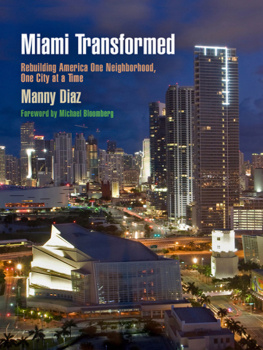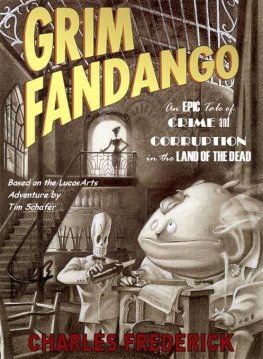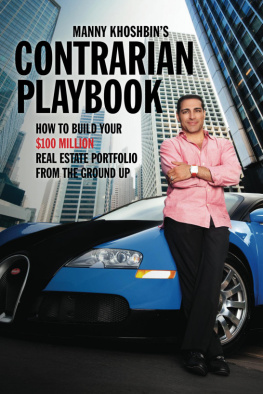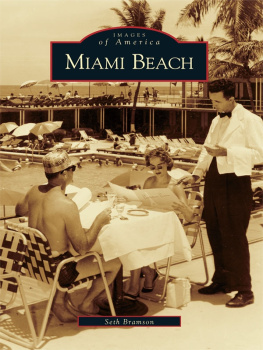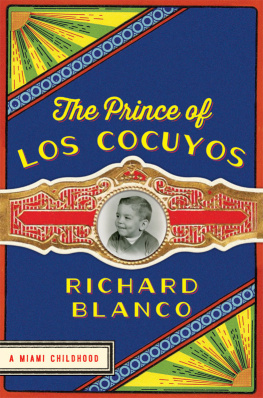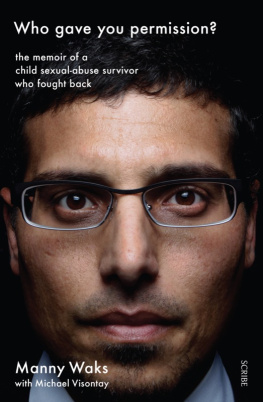THE CITY IN THE TWENTY-FIRST CENTURY
Eugenie L. Birch and Susan M. Wachter, Series Editors
Published in collaboration with the Penn Institute for Urban Research
Copyright 2013 University of Pennsylvania Press
All rights reserved. Except for brief quotations used for purposes of review or scholarly citation, none of this book may be reproduced in any form by any means without written permission from the publisher.
Published by
University of Pennsylvania Press
Philadelphia, Pennsylvania 19104-4112
www.upenn.edu/pennpress
Printed in the United States of America on acid-free paper
10 9 8 7 6 5 4 3 2 1
Library of Congress Cataloging-in-Publication Data
Diaz, Manny.
Miami transformed : rebuilding America one neighborhood, one city at a time / Manny Diaz ; foreword by Michael Bloomberg. 1st ed.
p. cm. (The city in the twenty-first century)
ISBN 978-0-8122-4464-9 (hardcover : alk. paper)
Includes bibliographical references and index.
1. Diaz, Manny. 2. MayorsFloridaMiamiBiography. 3. Cuban AmericansFloridaMiamiBiography. 4. Miami (Fla.)Politics and government21st century. 5. Miami (Fla.)Social conditions21st century. 6. Miami (Fla.)Economic conditions21st century. I. Bloomberg, Michael. I. Title. II. Series: The city in the twenty-first century
F319.M6 D48 2013
975.9'381 2012029839
Foreword Michael Bloomberg
W E NEED MORE elected officials like Manny Diaz. When Manny was first elected Mayor of Miami, he entered office with the single most important asset any new mayor can have: ignorance. He didnt know what he couldnt do. Those who spend their lives in politics learn to live by certain limitations: groups that cannot be challenged, laws that cannot be changed, projects that cannot be undertaken, words that cannot be uttered. Manny had spent his career in the private sector, and he brought none of this baggage with him. When people wise in the way of government told him one of his ideas could not be achieved, he asked a very simple, and very powerful, question: Why not?
This book is for everyone who asks that same question about local, state, or federal government. Why cant government be more efficient and effective? Why cant government get big things done? Why cant government be as innovative and dynamic as the private sector? The answer is: it can. But it takes leaders like Manny Diaz to make it happen.
On issue after issue, Mayor Diaz changed the way Miami city government approached long-standing problems. Instead of seeing poverty as inevitable, he saw it as an area where investments needed to be better targeted. Instead of lamenting the middle class exodus to the suburbs, he saw that residents were voting with their feet and needed to be convinced to come back to a city that cared about improving services. Instead of blaming failing schools on the bureaucracy, he led the charge to increase mayoral control. And instead of bemoaning traffic congestion, he advocated for expanded mass transit. Manny Diaz never stopped asking Why not? And the innovative approaches he pioneered helped Miami become a national leader on issues that will define the future of our country.
Ive had the pleasure of working with and getting to know Manny Diaz over the past decade. We were both first elected to office in November 2001. Both of us had spent our careers in the private sector. And both of us entered government with a philosophy based on pragmatism, not ideology.
Unlike members of Congress, mayors dont have the luxury of spending their days holding ideological debates. We are elected to solve problems that affect peoples everyday livesfrom fighting crime to fixing potholes. Neither of us believes that, when it comes to governing and public policy, one party has a monopoly on good ideas or truth. As New York Mayor Fiorello La Guardia said in the 1930s, There is no Democratic or Republican way to pick up the trash. That is still true today. The problem is that now, both parties spend more time maneuvering around problemsin order to position themselves to win the next electionthan they do fixing them.
Mayor Diaz and I both became Independents because we saw how, all too often, partisanship stands in the way of progress. The fact is, members of the two parties agree on far more than they admit. But for self-serving political reasons, they would rather engage in combat than collaboration. By and large, mayors put aside partisan differences to find common ground on the most important issuesand few have done it as effectively as Manny Diaz. This book is not only a great American success storyManny is the son of immigrants who worked his way to the topbut it is also a valuable lesson in the art of pragmatic politics.
Many of the issues Ive worked on with Manny have been ones that produce mostly gridlock in Washingtonincluding the most urgent, illegal guns. In 2006, we launched a bi-partisan coalition of Mayors Against Illegal Guns, which today has over 600 members around the country. As President of the U.S. Conference of Mayors, Manny was instrumental in helping the coalition growand helping us recruit Democratic, Republican, and Independent mayors. When it comes to illegal guns, both parties in Washington are beholden to special interestsand paralyzed by the fear that talking about the issue will hurt their reelection chances. But mayors see the deadly consequences of illegal guns every dayand we have an obligation to act.
The first responsibility of any mayor is to protect public safety. And mayors owe our police officersand their familiesour commitment to do everything possible to keep illegal guns off the streets. The vast majority of crimes committed with guns are committed by peoplefelons or the mentally illwho are not legally allowed to possess a gun. The message that our mayors coalition has brought to Washington is simple: enforce the laws preventing criminals and the mentally ill from getting guns. Its a message that more than 80 percent of gun owners agree with. Washington, however, remains more interested in ideological debates than pragmatic steps to enforce the law that would save lives.
Although illegal guns are a national problem, mayors understand that we cannot wait for Washington to act. And in Miami, Mayor Diaz refused to allow key public safety matters to be driven by local politics. Despite local opposition, he conducted a national search for a police chief, and ended up hiring one of New Yorks Finest: John Timoney. During Mayor Diazs tenure, crime fell dramatically in Miami, with the homicide rate dropping 76 percent from its highest point (similar to what we saw happen in New York). Only a few U.S. cities experienced a greater decrease in crime during the last decade.
Driving down crime is just one area where the mayor refused to allow the gridlock in Washington to prevent local action. For example, while very little is happening to address climate change in our nations capital, cities are leading the way. Under Mayor Diaz, Miami became a leader in the green buildings movement. And when I was in Miami a few years ago, I got a first-hand look at some of the public transit solutions Mayor Diaz had championed. They not only helped improved peoples commuting time, but helped reduce pollution too.



